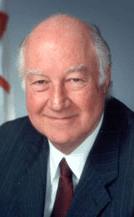Mr. Speaker, those of us who witnessed the recent celebrations of V-E Day cannot help but be reminded once again of the importance of the second world war and indeed the other wars in which Canada has participated. That war was a defining moment for this country.
It was a time when young Canadians from all across the country sacrificed themselves. Some went for various reasons. Some went because of valour. Some went because of patriotism. Some went out of a sense of duty. Some went for adventure. For whatever reason, they went. They went for their country and to defend and protect an important cause.
The second world war was a defining moment for us as a country. It helped to partially establish what we are as a country, what we stand for, what we believe in, what we are prepared to defend. It was also a defining moment for individuals, all of those young Canadians who went overseas. In the second world war it was not just young Canadians but young Newfoundlanders and Labradorians, because the province that I represent was not part of this country between 1939 and 1945. So there were young Canadians and young Newfoundlanders and young Labradorians who went over, serving in different forces but all for the same cause. Not only did it define our country, but it defined them as individuals. It gave them an experience that those of us who did not participate in that war can never appreciate.
I recall growing up in St. John's, which had an important role in the second world war because it was a jumping-off point for ships, planes, and personnel. I remember the blackouts and air raid sirens. I remember my father being in the home guard. I remember the soldiers, sailors, and airmen in the streets, in the clubs and in the USO. However, those of us who did not actually participate in the war cannot really appreciate what those young Canadians and Newfoundlanders went through as an experience. Not only was it a defining moment for our country, it was a defining moment for them as individuals. Some of them paid the supreme sacrifice by laying down their lives. We honoured them some time ago, and we honour them again today.
As the Legion continually says in its rituals, "At the going down of the sun and in the morning, we will remember them". We must remember them, not only for their sake but for our sake and for the sake of our country as well. If we forget that defining moment for the country and that defining moment for them as individuals, then history is bound to repeat itself. I want to make that point today while those events are fresh in our minds.
I do not want to be lengthy today, because the longer I speak the more we will hold up improvements to the veterans pension plan. What I want to say is that for those individuals who went overseas and lost their lives, we can only remember them, honour them and pay tribute to them, but for those who came back we can do something as a country. We have been doing something as a country but we must continue to do something as a country. These individuals gave up an important part of their lives and some of the best years of their lives. They gave up their younger years, when they could have been doing other things. We must remember them for that. Some of them also gave up abilities they had. Many of them were injured. Many of them were totally disabled. Some of them were partially disabled.
This country has taken the responsibility that we owe them for that, for the sacrifice they made and the contribution they made to us as a country and to the world.
Canada has been paying a pension. This particular piece of legislation will speed up the Canadian pension administration. It will merge the Canadian Pension Commission and the veterans commission into one. It will make a two-stage process and it will free up the lawyers who are available to work on the appeals for the veterans as they apply. It gives Veterans Affairs Canada the authority to make first-level decisions and it merges the Canadian Pension Commission and the Veterans Appeal Board into one appeal body.
We heard on my committee from a great many witnesses. We heard from very few who oppose this legislation. Some had some modifications they wanted made, and that is what the House of Commons process is all about. But by and large, people and veterans support this legislation and believe it will be an improvement in the amount of time. We have been far too lengthy in granting appeals to veterans in the past. We heard that in some cases it takes years for a veteran to get through the initial process and the appeal process. This legislation will speed up the process and make it more efficient.
There is really very little more to say. This is a simple piece of legislation but it is important. I encourage the House to pass it speedily. I believe there is all-party support for this. I urge the House to get on with the job because of what we owe those people who went over to represent us.

